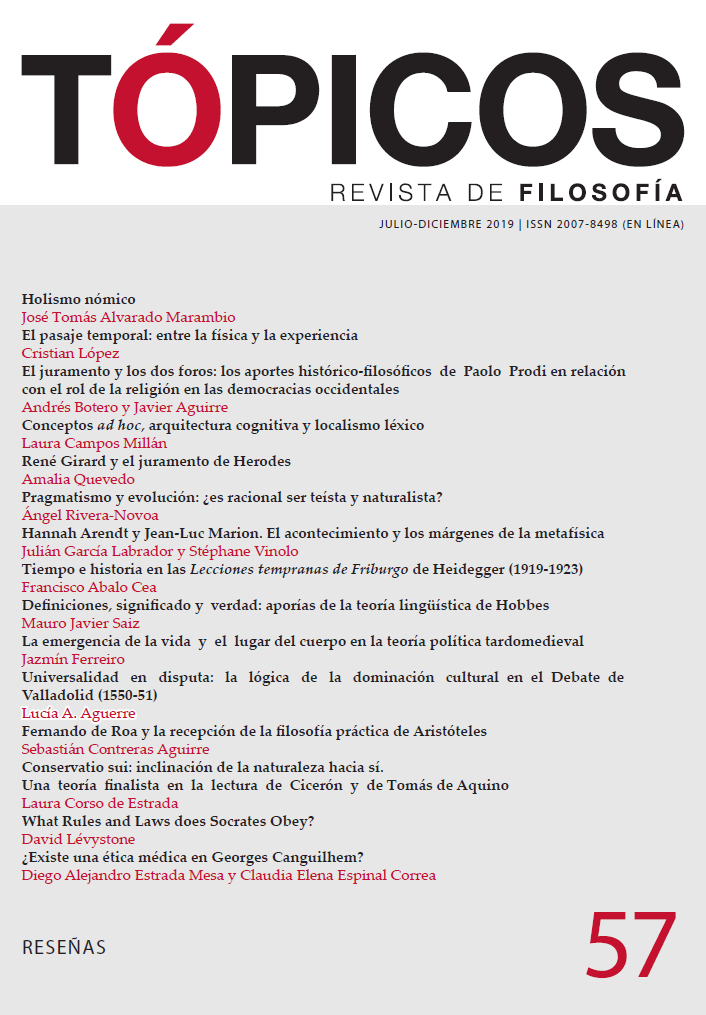Publicado 2019-06-29
Palabras clave
- subdeterminación lingüística,
- pragmaticismo,
- semanticismo,
- proposición intuitiva,
- composicionalidad
Cómo citar
Resumen
La Teoría de la Pertinencia hace una de las principales defensas de la tesis de subdeterminación lingüística local. Según esta tesis, el concepto intuitivo expresado por medio de un ítem léxico en la emisión de una oración es un concepto ad hoc que resulta de un proceso libre de control lingüístico. Los conceptos ad hoc se postulan porque introducen un tipo de organización cognitiva que se considera necesaria para satisfacer las demandas que, para esta Teoría, impone la comprensión de conceptos intuitivos. Aquí planteo que nuestro sistema cognitivo puede satisfacer estas demandas sin tolerar proposiciones determinadas básicamente por conceptos ad hoc. También planteo que la información suministrada por los conceptos ad hoc es dispensable para la comprensión de conceptos intuitivos. Finalmente, propongo una posición léxica local según la cual, el concepto intuitivo expresado a través de un ítem léxico es el concepto léxicamente asociado a ese ítem.
Referencias
- Bach, K. (1994). Conversational Impliciture. Mind & Language, 9(2), 124-162.
- Barsalou, L. (1987). The Instability of Graded Structure: Implications for the Nature of Concepts. En U. Neisser. (ed.), Concepts and Conceptual Development: Ecological and Intellectual Factors in Categorization. (pp. 101-140). Nueva York, EUA: Cambridge University Press.
- ---- (1993). Flexibility, Structure, and Linguistic Vagary in Concepts: Manifestations of a Compositional System of Perceptual Symbols. En A. C. Collins, S. E. Gathercole, y M. A. Conway. (eds.), Theories of Memory. (pp. 29-101). Londres, Reino Unido: Erlbaum Associates.
- ---- (1999). Perceptual Symbol Systems. Behavioral & Brain Sciences, 22(4), 577–660.
- Borg, E. (2016). Exploding Explicatures. Mind & Language, 31(3), 335-355.
- Carnie, A. (2013). Syntax. A Generative Introduction. West Sussex, Reino Unido: Blackwell.
- Carston, R. (2002). Thoughts and Utterances. The Pragmatics of Explicit Communication. Malden, EUA: Blackwell.
- ---- (2009). Relevance Theory: Contextualism or Pragmaticism? UCL Working Papers in Linguistics, 21, 17-24.
- ---- (2010). Lexical Pragmatics, Ad Hoc Concepts and Metaphor: A Relevance Theory perspective. Italian Journal of Linguistics, 22(1), 153-180.
- ---- (2012). Word Meaning and Concept Expressed. The Linguistic Review, 29(4), 607-623.
- Chomsky, N. (1986). Knowledge of Language. Its Nature, Origin and Use. Nueva York, EUA: Praeger.
- Fodor, J. (1998). Concepts. Where Cognitive Science Went Wrong. Nueva York, EUA: Oxford University Press.
- Grice, P. (1989). Logic and Conversation. En Studies in the Way of Words. (pp. 22-40). Cambridge, EUA: Harvard University Press.
- Kotseruba, I. y Tsotsos, J. (2016). 40 Years of Cognitive Architectures. Core Cognitive Abilities and Practical Applications. arXiv:1610.08602v2 [cs.AI]. Recuperado de: https://arxiv.org/pdf/1610.08602.pdf.
- Kroeger, P. (2005). Analyzing Grammar. An Introduction. Nueva York, EUA: Cambridge University Press.
- Laurence, S. y Margolis, E. (1999). Concepts and Cognitive Science. En E. Margolis y S. Laurence (eds.), Concepts: Core Readings. (pp. 3-81). Cambridge, EUA: Bradford Book/The MIT Press.
- ---- (2015). Concept Nativism and Neural Plasticity. En E. Margolis y S. Laurence (eds.), The Conceptual Mind. New Directions in the Study of Concepts. (pp. 117-147). Cambridge, EUA/Londres, Reino Unido: The MIT Press.
- Machery, E. (2009). Doing without Concepts. Nueva York, EUA: Oxford University Press.
- Margolis, E. y Laurence, S. (2003). Concepts. En S. Stich y T. Warfield (eds.), The Blackwell Guide to Philosophy of Mind. (pp. 190-213). Oxford, Reino Unido: Blackwell.
- ---- (2011). Learning Matters: The Role of Learning in Concept Acquisition. Mind & Language, 26(5), 507-539.
- Prinz, J. (2002). Furnishing the Mind. Concepts and their Perceptual Basis. Cambridge, EUA: The MIT Press.
- Recanati, F. (2004). Literal Meaning. Cambridge, EUA: Cambridge University Press.
- ---- (2010). Truth-conditional Pragmatics. Nueva York, EUA: Oxford University Press.
- Sperber, D. y Wilson, D. (1995). Relevance. Communication and Cognition. Cambridge, EUA: Blackwell.
- Travis, C. (2008). Meaning’s Role in Truth. En Occasion-Sensitivity. Selected Essays. (pp. 94-108). Nueva York, EUA: Oxford University Press.
- Wilson, D. (2003). Relevance and Lexical Pragmatics. Italian Journal of Linguistics, 15(2), 273-291.
- Wilson, D. y Carston, R. (2007). A Unitary Approach to Lexical Pragmatics: Relevance, Inference, and Ad Hoc Concepts. En N. Burton-Roberts (ed.), Advances in Pragmatics (pp. 230-255). Basingstoke, Reino Reino: Palgrave Macmillan.
- Wilson D. y Sperber, D. (2012). Meaning and Relevance. Cambridge, EUA: Cambridge University Press.
- Wunderlich, D. (2006). Advances in the Theory of the Lexicon. Berlín, Alemania: Mouton de Gruyter.






